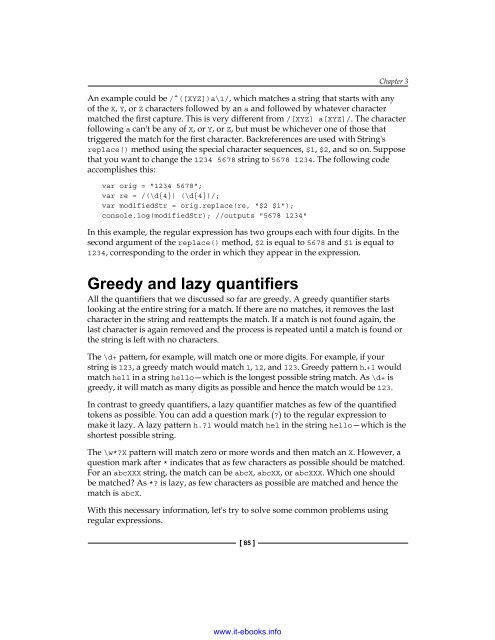You also want an ePaper? Increase the reach of your titles
YUMPU automatically turns print PDFs into web optimized ePapers that Google loves.
Chapter 3<br />
An example could be /^([XYZ])a\1/, which matches a string that starts with any<br />
of the X, Y, or Z characters followed by an a and followed by whatever character<br />
matched the first capture. This is very different from /[XYZ] a[XYZ]/. The character<br />
following a can't be any of X, or Y, or Z, but must be whichever one of those that<br />
triggered the match for the first character. Backreferences are used with String's<br />
replace() method using the special character sequences, $1, $2, and so on. Suppose<br />
that you want to change the 1234 5678 string to 5678 1234. The following code<br />
accomplishes this:<br />
var orig = "1234 5678";<br />
var re = /(\d{4}) (\d{4})/;<br />
var modifiedStr = orig.replace(re, "$2 $1");<br />
console.log(modifiedStr); //outputs "5678 1234"<br />
In this example, the regular expression has two groups each with four digits. In the<br />
second argument of the replace() method, $2 is equal to 5678 and $1 is equal to<br />
1234, corresponding to the order in which they appear in the expression.<br />
Greedy and lazy quantifiers<br />
All the quantifiers that we discussed so far are greedy. A greedy quantifier starts<br />
looking at the entire string for a match. If there are no matches, it removes the last<br />
character in the string and reattempts the match. If a match is not found again, the<br />
last character is again removed and the process is repeated until a match is found or<br />
the string is left with no characters.<br />
The \d+ pattern, for example, will match one or more digits. For example, if your<br />
string is 123, a greedy match would match 1, 12, and 123. Greedy pattern h.+l would<br />
match hell in a string hello—which is the longest possible string match. As \d+ is<br />
greedy, it will match as many digits as possible and hence the match would be 123.<br />
In contrast to greedy quantifiers, a lazy quantifier matches as few of the quantified<br />
tokens as possible. You can add a question mark (?) to the regular expression to<br />
make it lazy. A lazy pattern h.?l would match hel in the string hello—which is the<br />
shortest possible string.<br />
The \w*?X pattern will match zero or more words and then match an X. However, a<br />
question mark after * indicates that as few characters as possible should be matched.<br />
For an abcXXX string, the match can be abcX, abcXX, or abcXXX. Which one should<br />
be matched? As *? is lazy, as few characters as possible are matched and hence the<br />
match is abcX.<br />
With this necessary information, let's try to solve some common problems using<br />
regular expressions.<br />
[ 85 ]<br />
www.it-ebooks.info


